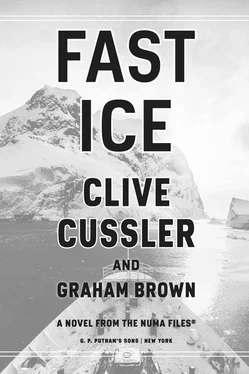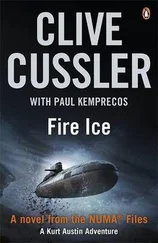“Will do.”
The group ahead of Joe had pushed through a hatchway. Joe eased up to it and cracked it open. Inside lay a vast compartment, half filled with water. Several tenders were tied up in there along with a couple ribbed inflatables.
The scene was oddly jumbled, as the list had caused the water to flow to the low side and the boats were all bunched up.
As the others climbed aboard one of the tenders, Björn forced a lever on the wall from the closed position to open. Machinery cranked to life and the doors at the far end of the compartment began to open.
A wave of water surged in, jostling the boats and banging them against one another. The self-leveling dock rose and the boats along with it. Joe raced up the steps as Björn and his mates cut the mooring line and shoved off, pushing toward the gap.
Joe jumped into a ribbed inflatable, which he chose for its speed, maneuverability and overall toughness.
He released the line, started the outboard motor and spun the boat around.
As he finished the turn, he saw the tender lifted on a swell that had surged into the compartment. The wave pinned it against a low-hanging section of the ceiling, its roof snagging on a bundle of pipes and cables.
“You’ve got to be kidding me,” Joe said.
Whoever was manning the tender’s controls gunned the throttle. The engine revved and the prop churned the water, but the tender was caught like a truck that had gone under too low of an overpass.
Joe was considering how he might give them a push, or otherwise free them, when the swell outside the ship turned into a trough. The water surged toward the exit, dropping rapidly and sweeping the tender out of the compartment and into the bay.
Joe had no desire to get pinned up against the overhanging pipes and cables, especially as the inflatable lacked a roof to protect his head.
He spun the inflatable in a circle as the next wave rushed in and then pointed the bow toward the exit as it pressed him up near the ceiling.
Joe raced out of the ship and turned toward the bow. “I’m on my way,” he shouted into the radio. “Get as close to the edge as you can.”
—
Bloodied and beaten, Ryland heaved the captain up to his feet. “Get control of this ship,” he demanded. “We’re heading for the cliffs.”
“It’s not the cliffs that are the problem,” the captain said. “It’s the rocks.”
Grunting with pain, he slammed the engines into full reverse and grabbed the rudder control, pushing it as far to the left as possible.
The Goliath began to shudder as the rudders deflected to their stops. The nose of the ship began to swing away from the cliffs, but the turn transferred all the ship’s weight and momentum to the low side of the hull.
The list worsened to thirty degrees and then forty. The ship continued toward the submerged outcropping of rock.
“Why aren’t we slowing?” Ryland demanded.
The Goliath ’s captain just stared at the screen. “We’re too heavy,” he said. “I’m sorry.”
The ice ship ran across the submerged shelf at fifteen knots. Boulders the size of railcars were blasted loose, while similar-sized chunks of ice were carved from the bottom of the ship. The deepest part of Goliath ’s V-shaped keel ground into the ridge and broke through it. And at a terrible cost. The heavy thruster pods and thousands of tons of ballast were scraped from the hull.
The massive weight and momentum of the huge ship allowed it to continue forward as if it were merely shrugging off the blow. The captain knew better, as he stared apoplectically out the bridge window at the tilting horizon.
—
Kurt felt the ship’s rudder go hard over. He knew this would mean the end. The ship simply could not turn away from the danger and not capsize. Not with all its weight on one side.
The outer edge of the main deck dipped into the water. Kurt dug the spikes of his boots in and leaned back, trying to keep from sliding. His perch grew steeper and more precarious as the big ship rolled. Soon, he was back on his haunches like a man shingling a steeply pitched roof.
From the corner of his eye, he spotted an inflatable with an outboard racing toward him. It rode up on the water that was engulfing the Goliath ’s hull.
Kurt’s left foot slipped, then his right. He slid down the angled deck toward the water, digging his boots in at the last second and jumping for the inflatable. He landed in the bow, crashing awkwardly and staying down as Joe gunned the throttle and turned away.
Looking up, he saw the Goliath standing on its side, stretching upward and then leaning over like a skyscraper about to fall. It picked up speed as it sank down. Joe cut away, racing to escape the pending collapse.
—
Back on the bridge, Ryland shook with rage and panic. He grabbed a pipe overhead to keep from falling. The ship was rolling.
“Do something,” he shouted.
The captain didn’t even respond. He just kept staring out the window.
The ship rolled past fifty degrees and then past sixty. The bulkhead wall became the floor.
The dark sea appeared through the windows. Ryland stared as it surged upward toward them and smashed home like a tsunami.
The surviving windows imploded and the seawater blasted in. The swirling water was frigid and unmerciful. It filled the compartment, battering everyone inside and forcing the air out of their lungs.
Ryland felt himself tumbling uncontrollably. He crashed into the wall and the floor and then ended up on the ceiling as the furious motion subsided. His lungs were filled with water, his eyes wide open, as his body went limp and still.
66
The storm would continue to blow for the next three days. By the time it waned, the Providence had arrived at the mouth of Fimbul Bay. It came upon the Goliath , floating, inverted, like a giant dead whale. The only thing that made it look like a ship were the red-painted propeller shafts and the broken stub of one rudder.
Kurt and Joe had set up shelter nearby, surviving the storm and guarding twenty-six members of Ryland’s crew, most of whom were too cold and hungry to walk by the time they were rescued.
Kurt called in to Rudi as soon as they were on board the ship. He found that the SEAL teams and the British SAS units had done their jobs flawlessly. Liang’s tankers had all been captured. All the boardings had gone without incident except one, where the captain of the ship had shot the saboteur after realizing what the man intended to do.
With Kurt and Joe safely aboard the Providence , a C-130 equipped with skis took off from McMurdo Station, crossing Antarctica toward Ryland’s Base Zero.
Touching down on the glacier, the aircraft rumbled to a stop but kept its engines running. Three figures got off and rushed toward the habitat. Rudi Gunn led the charge, having flown from Washington in the aftermath of the operation only to be forced to wait out the storm.
He found the structure just as Kurt had described it, though now it was almost completely buried in snow.
Pushing his way inside the first module of Ryland’s former base, Rudi saw no sign of life. He feared the worst. They hadn’t heard from Paul or Gamay even as conditions cleared and satellite communications were restored.
“Split up,” he ordered, sending the two Navy medics with him in different directions.
Each of them entered a different module, with Rudi following his nose. He smelled smoke and followed it through the building.
Pulling open an inner door, he spotted two figures lying on the floor, covered in blankets. A small fire crackled in front of them. A makeshift chimney constructed of PVC pipe evacuated the smoke through a hole in the roof above.
Читать дальше












